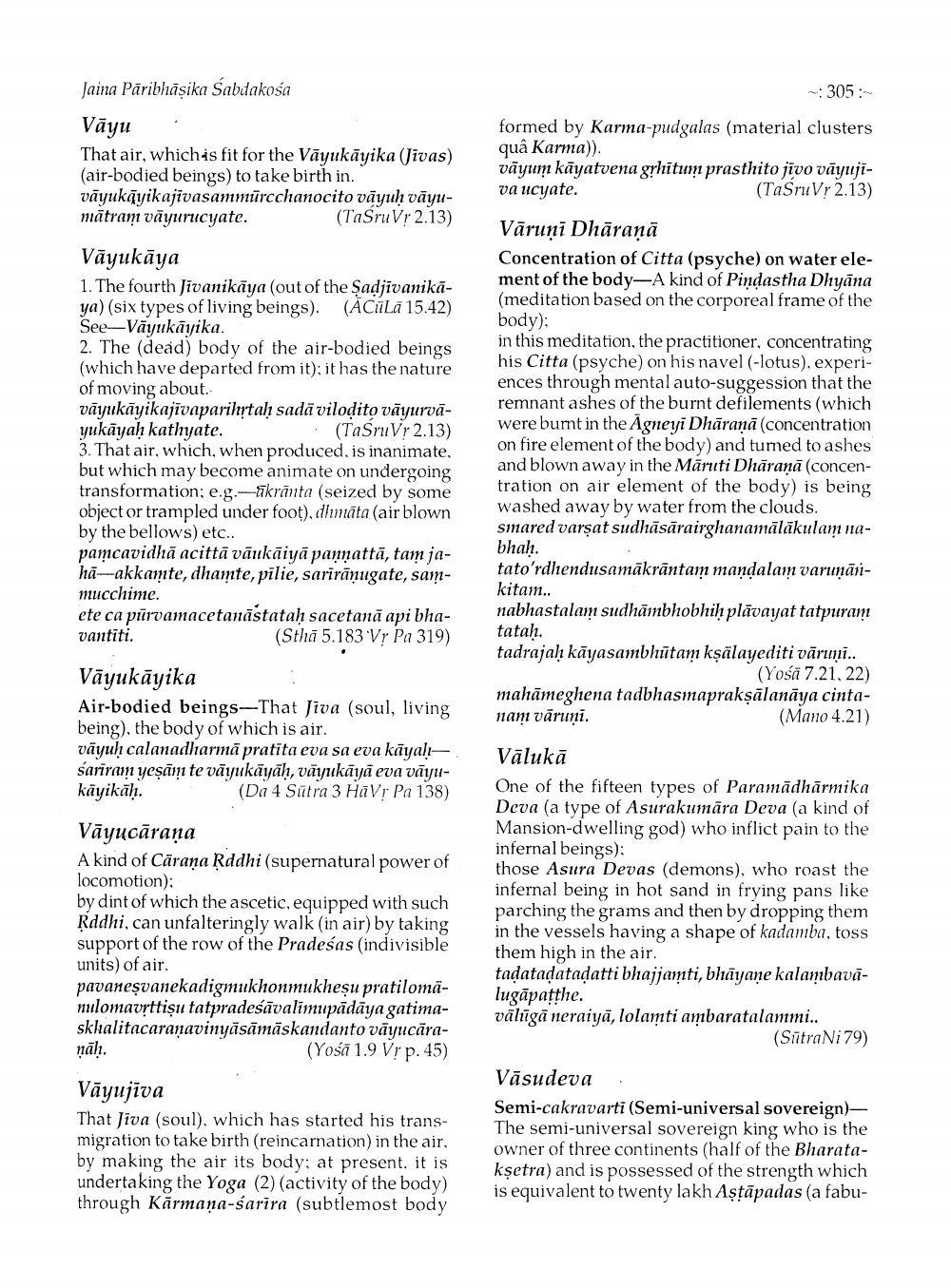________________
-305
Jaina Pāribhāṣika Sabdakosa Vāyu That air, which is fit for the Vāyukāyika (Jivas) (air-bodied beings) to take birth in. vāyukāyikajīvasammūrcchanocito vāyuh vāyumātram vāyurucyate.
(TaSru Vr 2.13)
formed by Karma-pudgalas (material clusters quâ Karma)). vāyum kāyatvena gļhitum prasthito jivo vāyujiva ucyate.
(TaSruVr 2.13)
Vāyukāya 1. The fourth Jivanikāya (out of the Sadjivanikāya) (six types of living beings). (ACūLa 15.42) See-Vāyukāyika. 2. The (dead) body of the air-bodied beings (which have departed from it); it has the nature of moving about. vāyukāyikajivaparihịtah sadā vilodito vĀyurvāyukāyah kathyate.
(TaSru Vr 2.13) 3. That air, which, when produced, is inanimate, but which may become animate on undergoing transformation; e.g.--īkrānta (seized by some object or trampled under foot), dlımāta (air blown by the bellows) etc.. pamcavidhā acittā vāukāiyā pannattā, tam jaha-akkamte, dhamte, pilie, sarīrānugate, sammucchime. ete ca purvamacetanāstataḥ sacetană api bhavantiti.
(Sthā 5.183'Vr Pa 319)
Vāruni Dhāranā Concentration of Citta (psyche) on water element of the body-A kind of Pindastha Dhyāna (meditation based on the corporeal frame of the body); in this meditation, the practitioner, concentrating his Citta (psyche) on his navel (-lotus), experiences through mental auto-suggession that the remnant ashes of the burnt defilements (which were burnt in the Agneyi Dhāranā (concentration on fire element of the body) and turned to ashes and blown away in the Māruti Dhāraņā (concentration on air element of the body) is being washed away by water from the clouds. smared varşat sudhāsārairghanamālākulam nabhah. tato'rdhendusamākrāntam mandalam varunārikitam.. nabhastalam sudhāmbhobhih plāvayat tatpuram tatah. tadrajah kāyasambhūtam kşälayediti vārun..
(Yośā 7.21.22) mahāmeghena tadbhasmaprakṣālanāya cintanam vāruņi.
(Mano 4.21)
Vāyukāyika Air-bodied beings-That Jiva (soul, living being), the body of which is air. vāyuh calanadharmā pratita eva sa eva kāyahsarīram yeşām te vāyukāyāh, vāyukāyā eva vāyukāyikāh.
(Da 4 Sutra 3 HÔVr Pa 138)
Vāyucārana A kind of Cāraņa Ķddhi (supernatural power of locomotion); by dint of which the ascetic, equipped with such Rddhi, can unfalteringly walk (in air) by taking support of the row of the Pradeśas (indivisible units) of air. pavanesvanekadigmukhonmukhesu pratilomānulomavrttișu tatpradeśāvalimupādāya gatimaskhalitacaraṇavinyāsāmāskandanto vāyucāranāh.
(Yośā 1.9 V; p.45)
Vālukā One of the fifteen types of Paramādhārmika Deva (a type of Asurakumāra Deva (a kind of Mansion-dwelling god) who inflict pain to the infernal beings): those Asura Devas (demons), who roast the infernal being in hot sand in frying pans like parching the grams and then by dropping them in the vessels having a shape of kadamba, toss them high in the air. tadatadatadatti bhajjamti, bhāyane kalambavālugāpatthe. vālūgā neraiyā, lolamti ambaratalammi..
(SūtraNi 79)
Vāyujiva That Jiva (soul), which has started his transmigration to take birth (reincarnation) in the air, by making the air its body: at present, it is undertaking the Yoga (2) (activity of the body) through Kārmaņa-sarira (subtlemost body
Vāsudeva . Semi-cakravarti (Semi-universal sovereign)The semi-universal sovereign king who is the owner of three continents (half of the Bharatakşetra) and is possessed of the strength which is equivalent to twenty lakh Aştāpadas (a fabu




